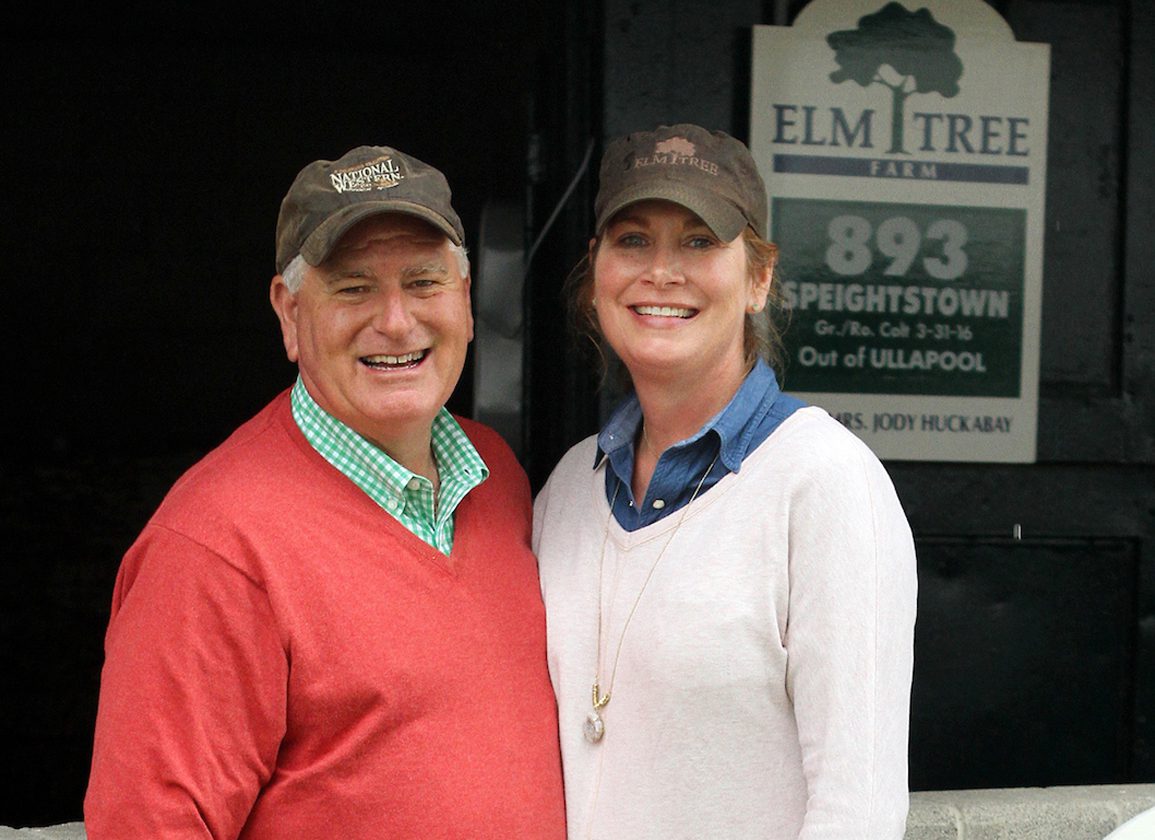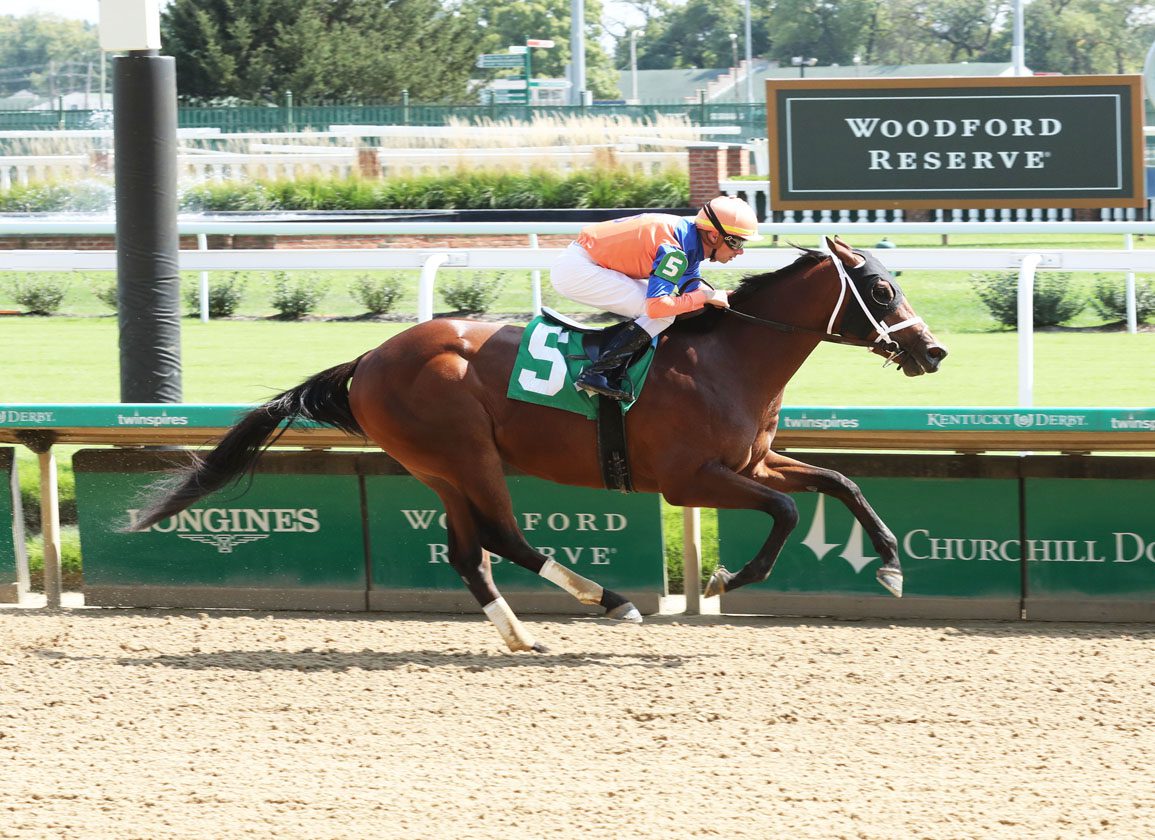They were already through the show ring and into the Keeneland pavilion, circling for their turn. Jody Huckabay knew that the dam’s only previous foal, a Ghostzapper colt, had coincidentally been declared to make his debut at Churchill the same afternoon. Still more fortuitously, the rate of selling that session last September had now conspired to let him advertise their genes even as his half-sister by Flatter was strolling the back ring.
“I couldn’t see the race but had people watching,” Huckabay recalls. “And suddenly my phone was going off, and they were running back in to tell me this horse just freaked at Churchill.”
By eight and a half lengths, in fact, having started odds-on for Brad Cox. Huckabay had already told their breeder, P.L. Blake of Pop-A-Top Stables, not to give this filly away. Okay, she wasn’t a total paragon, conformationally, but she was very intelligent and never seemed to get tired. They had set a $75,000 reserve.
“Look, let’s not sell her,” Huckabay suggested now. But Blake told him to let the market decide, and didn’t even elevate the reserve.
Well, people are busy at that sale. But the fact is that nobody was sharp enough to clock what had just happened, and the filly was led out unsold at $70,000.
“And afterwards, of course, a multitude of people came back and tried to buy her!” Huckabay says. “If they’re consigned, we try to get them to the ring and give the public the opportunity. But as soon as somebody didn’t buy her, Mr. Blake said, ‘That’s it. They had their shot.’”
And that is the real point of this story. It’s not just that the filly’s half-brother happens to be none other than Loggins, beaten only a neck by champion Forte (Violence) in his only subsequent start despite being exposed to a grueling pace in the GI Claiborne Breeders’ Futurity. For now, admittedly, Loggins must rely on Forte as his proxy on the Derby trail when resurfacing at Gulfstream on Saturday, his own resumption having been delayed so that he will have to renew their rivalry down the line. But whatever happens, it’s already hugely fulfilling for both the Blake family and Elm Tree Farm to see a young mare vindicate their shared insistence on doing things right.
They know that it’s a long game, but that you may get rewarded if you trust the process and stay patient. The Blakes had retained Beyond Blame (Blame), the dam of Loggins, for their own small operation though she could have been cashed in after winning four of her eight starts including the GIII Regret S. After all, she’d been homebred from a mare found in the same ring by Huckabay, at the 2011 November Sale, for $140,000.
So this third-generation filly by Flatter was a classic example of playing it straight: Blake didn’t try hastily to exploit the situation, but nor did he let other people move the goalposts, either.
“I’m glad we didn’t sell her, I’ll be honest,” Huckabay says. “She could be a nice broodmare. She’s with Dr. Eisaman in Florida now and doing well so far. It’s fulfilling, very fulfilling, to work for good people. Our very first paying customers, Danny and Cindy Bockmon from East Texas, are still here with us. They only keep a couple of horses, but they’ve been very loyal clients, for many years, and we bought a mare with them in November.
“So when you get a horse like Loggins coming along, that’s what gets me up in the morning. I get emotional about it, because this is a tough business and a hard life. And we’ve been doing it a while. Man, we’ve been trying for 38 years. It takes time to get all this to come together.”
Yes, indeed: if “mighty oaks from little acorns grow”, then that is no less true of Elm Tree Farm. The very name has deep roots: Huckabay’s grandfather owned a plantation in Louisiana named Elmwood, but lost it in the Depression. In the 1970s, Huckabay’s father was able to buy back some of that lamented acreage. When Huckabay and his wife-to-be Michelle founded their farm in 1989, it was named in homage to those original steadings.
Though his father and grandfather had both been country doctors, neither Huckabay nor his sisters turned out to share the family vocation.
“My father and a partner had the last privately-owned hospital in the state of Louisiana,” Huckabay recalls. “But he worked 24/7, there was hardly time for family. Thank goodness my mother had time to raise us! But both my parents were certainly instrumental in helping us get that first parcel of land, here in Kentucky, besides giving us lots of direction and guidance. Without them, we’d never have been able to get where we are now.”
But a less literal inheritance was equally important. Raised among cattle and horses, Huckabay had absorbed stockmanship throughout his boyhood. He showed Arabian horses for his father all around the country, and was no more than nine when daily feeding “a hundred and something mares” after school. Moreover, it was his responsibility to alert his father at the surgery if anything were then amiss.
Huckabay was introduced to Thoroughbreds when his father became a founding shareholder of Louisiana Downs in 1974. And by the time he finished college in his home state, Huckabay was opting for the University of Kentucky as graduate school specifically to “get my feet wet” in the Bluegrass.
It was at U.K. that he found a partner in life and work. Michelle had grown up riding hunter jumpers in North Carolina, and together they established a farm near Paris comprising “one barn, two fields, three paddocks and a wheelbarrow.” They also had one half of a $500 mare, albeit not especially certain where to find the $250.
“We started out with 112 acres but only about 60 ready for horses,” Huckabay recalls. “The rest wasn’t even fenced and had sat idle for several years. There was a recession at the time, and we had one paying boarder. It was pretty dire at times.”
Dire enough that Huckabay couldn’t turn down an offer to return to the University of Kentucky and run their horse farm for a spell. But after marriage and the arrival of a daughter, Huckabay told Michelle that trying to do two things at once meant doing neither properly. He brought a trailer house to the farm, promising to build a house after six months. In the event they lived in that trailer for four years.
“For years we parlayed everything we had back into the farm,” Huckabay recalls. “But both of us are cut of the same cloth, in that failure was not an option. We were going to persevere no matter what. Even today it seems like I’m never content: I’m always wanting to do better, always pushing for the next stakes horse, for a better sale. That’s probably one of my faults. But when you think how many years we’ve been doing it now, and all the people that have come and gone, and we’re still pressing forward… Well, we’re very proud of that.”
The farm has since expanded to 600 acres with eight barns, 125 stalls and a faithful core of returning customers. Around 15 of the 105 mares to be bred this spring are Elm Tree’s own; the rest belong to clients large and small. (Those who sell through their consignment, meanwhile, extend right the way to Stonestreet.)
What brings them to Elm Tree? Well, it certainly isn’t bragging; nor even advertising. “It’s always been word of mouth,” says Huckabay. “Secondly, the land. As far as I’m concerned, it’s the best in the world. You could raise anything out here. And thirdly, our motto is ‘solid from the ground up’. We believe in treating every individual horse as if we own it. From the matings, to raising them the very best we can. If you do that, every one of them has a chance to run. We’ve had several that were mediocre sale horses come on to be leading runners. For example, the mare You (You And I) that we raised for Mr. Dolphus Morrison. We couldn’t get $7,500 for her as a yearling [Keeneland September 2000] and she won six Grade Is.”
Huckabay’s degree in equine nutrition signposts another key element of the Elm Tree regime.
“But I’m also a big believer in raising horses outside,” he stresses. “Yes, our horses come in and they’re fed and checked once a day, but then they’re turned back out. Unless it’s inclement weather, they stay outside all but two hours a day. We know they have to be managed and taught proper etiquette, to get their feet trimmed and be groomed. But you have to let them be horses.”
You hear that often enough, but a less common dimension to this program is a herd of pedigree Angus cattle. That adds 125 calvings to the workload, but there are all kinds of dividends, whether in terms of emotional satisfaction or scientific inquiry. After all, John Magnier is famed for his eye for cattle; and Huckabay remembers reading how another great breeder, Bull Hancock, considered cattle to be useful aerators in their grazing.
“People ask me all the time, ‘Why are you doing all that stuff?’” Huckabay admits. “Well, one, we enjoy it, me and my wife. It’s a lot of work but we’re homebodies. But we also do a lot of rotational grazing. It breaks the parasite cycle. And of course they eat a lot of grass. We’ve got tremendous grass in Kentucky, and the horses can’t utilize it all. And finally, we recycle our muck. We put up a lot of bluegrass bedding, and then we feed that back to the cattle.”
Huckabay reckons you can learn a lot about cattle from horses, and vice versa. True, there are radical divergences-artificial insemination, embryo transfer-but someday he envisages horsemen informing their breeding decisions with similarly increased DNA testing. Above all, however, he feels that the cows help to hone his intuitions about the maze of genetics.
“I love the breeding side, whether it’s horses or cattle or dogs,” he says. “And I think if you’re a good stockman, you can apply it to about anything. You see that in your labor. Some people have that sixth sense, and just pick right up on it. And other ones don’t, and never will.”
With the farm now embarked on another foaling cycle, Beyond Blame is actually one of those only on the covering loop. She missed on a late cover last year, but was duly booked for an early date with Life Is Good. Meanwhile she has a “very, very nice” colt by Authentic set for sales prep, while her “gorgeous” dam Quippery (Forest Wildcat), at 16, has a yearling filly by Game Winner.
This continuing dynasty represents a cherished memorial to Blake’s late wife Shirley, who died in November 2018.
“A very special lady,” Huckabay says. “She loved the horses, and Mr. Blake told me that one of the last things she said was, ‘I don’t want you to get out of the horse business! I want you to keep going.’ And so they have, with some of the children now involved and enjoying it too. They’ve four mares with us right now: three are graded stakes-producing mares, while the other is half-sister to a couple.”
Loggins duly feel like an apt memorial to his departed breeder.
“He was a horse that we were always very high on,” Huckabay recalls. “He was kind of special from the time he was born. He wasn’t mean, but always had a cocky air about him. And prepping him, he did everything right. He was never sick, never had any problems. He would do whatever you wanted, and never got tired.”
Cox had trained Beyond Blame, who had required patience with a couple of issues but combined talent with a notably tough outlook. And he was duly determined that his “Colts Group” take her $460,000 son from the Denali consignment at Saratoga.
After outclassing inferiors on debut, Loggins certainly showed his dam’s fighting qualities in what proved a very demanding second assignment. “It was a very physical race, he got banged and bumped several times, but I thought he showed lots of courage,” Huckabay remarks. “He did a lot of the dirty work and was still fighting at the end.”
It feels instructive of the Elm Tree way that even a conspicuous new client should actually have had many years to learn what kind of people they would be dealing with.
“Michael and Susan Simpson lived across the fence from where I was raised in Louisiana,” Huckabay explains, when asked about their arrival on the scene. “I went to school with Susan, all the way from first grade to graduate high school, and we’ve been very good friends, well, my whole life. And out of the blue they called last year and said they were interested in buying a mare. Unfortunately, their first one had a dead foal-but they came back in November and jumped in with both feet to buy two very nice mares.”
Even in opening a new chapter, then, the Huckabays have built on a reputation earned over many years. And exactly the same applies to the growing involvement of their daughter Caroline, along with son Jack when not away at college.
Caroline was actually on another path until Huckabay had to tackle a bout of cancer three years ago. “She’s a very good equestrian but hadn’t really developed that passion for the farm until I got sick and we talked her into coming back in,” he explains. “Now she really enjoys it and she’s doing a very, very good job. Both kids are certainly stepping up, and hopefully that keeps going. To have them involved as well now is very rewarding.”
Since his reprieve, meanwhile, Huckabay himself cherishes his way of life more than ever.
“I vividly remember being in the third grade and drawing on a piece of paper what I wanted to do,” he says. “And I had my horses, I had cattle, a dog kennel, my house: I had everything down on that piece of paper. So I’m one of those rare people that have been able to do exactly what they always wanted to do, from a very young age.
“I can hardly put it in words, how lucky I feel-especially after going through a life-changing experience like I did. I’d never been sick a day in my life and it came on very sudden. We caught it early but it certainly changed my perspective. It’s a cliché, but I appreciate the little things a lot more. Just getting up in the morning and driving round the farm, it’s a different feeling. And when you go to bed at night, you thank God for giving you another good day.”
The post Elm Tree Rooted in Solid Ground appeared first on TDN | Thoroughbred Daily News | Horse Racing News, Results and Video | Thoroughbred Breeding and Auctions.








